Malian Armed Forces
This article has an unclear citation style. (December 2019) |
| Malian Armed Forces | |
|---|---|
| Forces Armées Maliennes | |
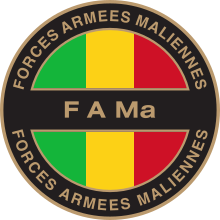 | |
| Founded | 10 October 1960[1][2][3] |
| Service branches | Malian Army Malian Air Force Malian Gendarmerie Republican Guard National Police (Sûreté Nationale) |
| Headquarters | Bamako |
| Website | fama |
| Leadership | |
| Commander-in-chief | Assimi Goïta |
| Minister of Defence | Sadio Camara |
| Chief of General Staff | Oumar Diarra |
| Personnel | |
| Conscription | Compulsory military service[4] |
| Active personnel | 40,000 plus 4,800 paramilitary forces |
| Expenditure | |
| Budget | $200–300 million ($5 million procurement) (FY03) |
| Percent of GDP | 3% (FY01) |
| Industry | |
| Foreign suppliers | |
| Related articles | |
| Ranks | Military ranks of Mali |
The Malian Armed Forces (French: Forces Armées Maliennes) consists of the Army (French: Armée de Terre), Republic of Mali Air Force (French: Force Aérienne de la République du Mali), and National Guard.[7] They number some 7,000 and are under the control of the Minister of Armed Forces and Veterans. The Library of Congress as of January 2005 stated that "[t]he military is underpaid, poorly equipped, and in need of rationalization. Its organisation has suffered from the incorporation of Tuareg irregular forces into the regular military following a 1992 agreement between the government and Tuareg rebel forces."[8]
In 2009, the IISS Military Balance listed 7,350 soldiers in the Army, 400 in the Air Force, and 50 in the Navy.[9] The Gendarmerie and local police forces (under the Ministry of Interior and Security) maintain internal security. The IISS listed paramilitary total force as 4,800 personnel: 1,800 in the Gendarmerie (8 companies), 2,000 in the Republican Guard, and 1,000 police officers. A few Malians receive military training in the United States, France, and Germany.
Military expenditures total about 13% of the national budget. Mali is an active contributor to peacekeeping forces in West and Central Africa; the Library of Congress said that in 2004 Mali was participating in United Nations operations in the Democratic Republic of Congo (MONUC, 28 personnel including 27 observers), Liberia (UNMIL, 252 personnel, including 4 observers), and Sierra Leone (3 observers).
History
[edit]The Malian armed forces were initially formed by Malian conscript and volunteer veterans of the French Armed Forces. In the months preceding the formation of the Malian armed forces, the French Armed Forces withdrew from their bases in Mali.

Among the last bases to be closed were those at Kati, on 8 June 1961, Tessalit (base aérienne secondaire), on 8 July 1961, Gao (base aérienne 163 de Gao), on 2 August 1961, and Air Base 162 at Bamako (base aérienne 162 de Bamako), on 5 September 1961.[1]
"On 1 October 1960, the Malian army was created and solemnly installed through a speech by Chief of Staff Captain Sekou Traore. On 12 October the same year, the population of Bamako attended for the first time an army parade under the command of Captain Tiemoko Konate. Organizationally, says Sega Sissoko, is the only battalion of Ségou and includes units scattered across the territory. A memo from the Chief of Staff ordered a realignment of the battalion. Following on, a command and services detachment in Bamako was created, and the engineer company in Ségou, the first Saharan motorized company of Gao, the Saharan Motor Company of Kidal, the Arouane nomad group, nomadic group of Timetrine (in the commune of Timtaghène), the 1st Reconnaissance Company and Nioro 2nd Reconnaissance Company Tessalit. As of 16 January 1961, Mali's army totaled 1232 men."[1][3]
In the sixties and seventies, Mali's army and air force relied primarily on the Soviet Union for materiel and training.[8]
On 19 November 1968, a group of young Malian officers staged a bloodless coup and set up a 14-member military junta, with Lieutenant Moussa Traoré as president. The military leaders attempted to pursue economic reforms, but for several years faced debilitating internal political struggles and the disastrous Sahelian drought. A new constitution, approved in 1974, created a one-party state and was designed to move Mali toward civilian rule. The military leaders remained in power.[10]
Single-party presidential and legislative elections were held in June 1979, and General Moussa Traoré received 99% of the votes. His efforts at consolidating the single-party government were challenged in 1980 by student-led anti-government demonstrations, which were brutally put down, and by three coup attempts. The Traore government ruled throughout the 1970s and 1980s. On 26 March 1991, after four days of intense anti-government rioting, a group of 17 military officers, led by subsequent President Amadou Toumani Touré, arrested President Traoré and suspended the constitution. They formed a civilian-heavy provisional ruling body, and initiated a process that led to democratic elections.[10]
The Tuareg rebellion began in 1990 when Tuareg separatists attacked government buildings around Gao. The armed forces' reprisals led to a full-blown rebellion in which the absence of opportunities for Tuareg in the army was a major complaint. The conflict died down after Alpha Konaré formed a new government and made reparations in 1992. Also, Mali created a new self-governing region, the Kidal Region, and provided for greater Tuareg integration into Malian society. In 1994, Tuareg, reputed to have been trained and armed by Libya, attacked Gao, which again led to major Malian Army reprisals and to the creation of the Ghanda Koi Songhai militia to combat the Tuareg. Mali effectively fell into civil war.
As of June 2008, service commanders were Colonel Boubacar Togola (Armée de Terre), Colonel Waly Sissoko (Armée de l'Air), Lieutenant-Colonel Daouda Sogoba (Garde Nationale) et du Colonel Adama Dembélé (Gendarmerie Nationale).[11]
The Malian army largely collapsed during the war against Tuareg separatists and Islamist rebels in early 2012. In a span of less than fourth months at the start of 2012, the Malian army was defeated by the rebels who seized more than 60% of the former Malian territory, taking all camps and position of the army, capturing and killing hundreds of Malian soldiers, while hundred others deserted or defected.[12]
Following the rebel advance, a group of soldiers from the Kati camp near Bamako staged a coup on 22 March 2012 which overthrew Malian president Amadou Toumani Touré. After the junta seized power, they successfully repelled a counter coup on 30 April by loyalists from the red berets elite units.[13]
The Malian military was rebuilt by French forces, and is now capable of conducting counter terrorism operations. In February 2020, the army stated that up to 200 Malian troops arrived in Kidal, a Northern city. This was the first time the army was deployed in this area because of the Tuareg Separatists rebels that chased out the army since 2014.[14]
On 1 November 2019, the IS-GS militants killed at least 50 soldiers in the 2019 Indelimane attack in the Ménaka Region of Mali.[15]
Since the 2020 coup, the military received equipment from Turkish forces.[6]
On 7 September 2023, at least 154 civilians and fifteen Malian soldiers were killed when al-Qaeda linked JNIM militants simultaneously attacked a Malian military camp at Bamba and the civilian boat Tombouctou on the Niger River near the village of Banikane, Gourma-Rharous..[16]
In July 2024, CSP-DPA rebels and JNIM militants killed dozens of Russian mercenaries and Malian government forces during the Battle of Tinzaouaten.[17] On 17 September 2024, JNIM militants attacked several locations across Bamako, the capital of Mali, including police and military installations, killing at least 77 people and injuring 255 others.[18]
Army
[edit]Manpower is provided by two-year selective conscription. Mali apparently has six military regions, according to Jane's World Armies. The 1st Military Region and 13th Combined Arms Regiment may be in Gao.[19] The 3rd Military Region appears to be at Kati.[20] The 4th Military Region is at Kayes[21] and the 5th Military Region is at Timbuktu.[22]
The 512 Regiment was reported within the 5th Military Region in 2004.[23] In 2010 Agence France-Presse reported that French training would be given to the 62nd Motorized Infantry Regiment of the 6th Military Region, based at Sévaré.[24] The same story said that the regiment consisted of three Rapid Intervention Companies (CIR) and AFP said it was "considered the elite...of the Malian army."[24]
Mali is one of four Saharan states which created a Joint Military Staff Committee in 2010, to be based at Tamanrasset in southern Algeria. Algeria, Mauritania, Niger, and Mali were to take part.[25]
The 134e Escadron de Reconnaissance (reconnaissance squadron) was to be trained to operate the French ACMAT Bastion APC by the EUTM Mali.[26]
The Army controls the small navy (approx. 130 sailors and 3 river patrol boats).
| List of Malian generals | ||||
|---|---|---|---|---|
| Nº | Rank | Name | Corps of origin | Date of nomination |
| 1st republic 1960 – 1968 | ||||
| 01 | Général de Brigade | Abdoulaye SOUMARÉ (deceased) | Infantry | 29 December 1960 |
| 2nd republic, 1968 – 1991 | ||||
| 02 | Général d'Armée | Moussa Traoré (deceased) | Infantry | 1974/79 |
| 03 | Général de Division | Amadou Baba Diarra (deceased) | Armour | 1981/84 |
| 04 | Général de Division | Filifing SISSOKO (deceased) | Air Force | 1982/84 |
| 05 | Général de Division | Sékou LY (deceased) | Armour | 1984/86 |
| 06 | Général de Brigade | Bougary SANGARÉ (deceased) | Infantry | 1985/89 |
| 07 | Général de Brigade | Abdoulaye OUOLOGUEM (deceased) | Infantry | 1985/89 |
| 08 | Général de Brigade | Amara DANFAGA (deceased) | Infantry | 1985/90 |
| 09 | Général de Brigade | Sory Ibrahim SILLA (deceased) | Infantry | 1987/90 |
| 10 | Général de Brigade | Mamadou COULIBALY | Air Force | 1987/91 |
| 3rd republic, Alpha Oumar Konaré, 1991 – 2002 | ||||
| 11 | Général d'Armée | Amadou Toumani TOURÉ (deceased) | Infantry | 20 January 1995 |
| 12 | Général de Division | Bourama Siré TRAORÉ | Air Force | 1997/99 |
| 13 | Général de Division | Cheick O. DIARRA (deceased) | Air Force | 1997/99 |
| 14 | Général de Division | Kafougouna KONÉ | Infantry | 1997/99 |
| 15 | Général de Division | Tiécoura DOUMBIA | Artillery | 1997/99 |
| 16 | Général de Brigade | Mamadou DOUCOURÉ | Air Force | 1997/99 |
| 17 | Général de Brigade | Abdoul Karim DIOP | Engineers | 1997/99 |
| 18 | Général de Brigade | Siriman KEITA (deceased) | Infantry | 1999/2000 |
| 3rd republic, Amadou Toumani Touré, 2002 – 2010 | ||||
| 19 | Général de Brigade | Seydou TRAORÉ | Infantry | 2005 |
| 20 | Général de Brigade | Salif TRAORÉ | Air Force | 2006 |
| 21 | Général de Brigade | Sadio GASSAMA | Infantry | 1 January 2007 |
| 22 | Général de Brigade | Toumani SISSOKO | Infantry | 1 January 2007 |
| 23 | Général de Brigade | Pangassy SANGARÉ | Armour | 1 January 2007 |
| 24 | Général de Brigade | Tiefolo TOGOLA | Infantry | 1 January 2007 |
| 25 | Général de Brigade | Brahima COULIBALY | Artillery | 1 January 2007 |
| 26 | Général de Brigade | Lassana KONÉ | Armour | 1 January 2007 |
| 27 | Général de Division | Youssouf BAMBA | Air Force | 1 January 2007 |
| 28 | Général de Division | Souleymane Sidibé (deceased) | Gendarmerie | 1 January 2007 |
| 29 | Général de Brigade | Naïny TOURÉ | Gendarmerie | 1 January 2007 |
| 30 | Général de Division | Gabriel POUDIOUGOU | Infantry | 12 June 2008 |
| 31 | Général de Brigade | Mahamane TOURÉ | Infantry | 1 October 2010 |
| 32 | Général de Brigade | Mamadou DIALLO | Infantry | 1 October 2010 |
| 33 | Général de Brigade | Kalifa KEITA | Armour | 1 October 2010 |
| 34 | Général de Brigade | Bégrélé SIORO | Air Force | 1 October 2010 |
| 35 | Général de Brigade | Mamadou TOGOLA | Air Force | 1 October 2010 |
| 36 | Général de Brigade | Siaka SANGARÉ | Air Force | 1 October 2010 |
| 37 | Général de Brigade | Samballa DIALLO | Gendarmerie | 1 October 2010 |
| 38 | Général de Brigade | Sirakoro SANGARÉ | Engineers | 1 October 2010 |
| 39 | Général de Brigade | Djibril SANGARÉ | DCSSA | 1 October 2010 |
| 40 | Général de Brigade | Mohamed COULIBALY | DCSSA | 1 October 2010 |
| 41 | Général de Brigade | Kani DIABATÉ | DCSSA | 1 October 2010 |
| 42 | Général de Brigade | Minkoro KANÉ | Infantry | 1 October 2010 |
| 43 | Général de Brigade | Youssouf GOÏTA | Infantry | 1 October 2010 |
| 44 | Général de Brigade | Yakouba SIDIBÉ | Artillery | 1 October 2010 |
| 45 | Général de Brigade | Ismaïla CISSÉ | Artillery | 1 October 2010 |
| 46 | Général de Brigade | Lamine DIABIRA | Armour | 1 October 2010 |
| 47 | Général de Brigade | Cheick Fanta M. MAIGA | Administration | 1 October 2010 |
| 48 | Général de Brigade | Hamet SIDIBÉ | Air Force | 1 October 2010 |
| 49 | Général de Brigade | Hamidou SISSOKO | Gendarmerie | 1 October 2010 |
| 50 | Général de Brigade | Idrissa DJILLA | Engineers | 1 October 2010 |
| 51 | Général de Brigade | Sékou Hamed NIAMBÉlÉ | DTTA (transmission) | 1 October 2010 |
| 52 | Général de Brigade | Mady MACALOU | DCSSA | 1 October 2010 |
| 53 | Général de Brigade | Fanta KONIPO (décédé) | DCSSA | 1 October 2010 |
| 54 | Général de Brigade | Amadou Baba TOURÉ (décéssed) | Infantry | 1 October 2010 |
| 55 | Général de Brigade | Waly SISSOKO | Air Force | 1 January 2012 |
| 56 | Général de Brigade | Soumana KOUYATE | Air Force | 1 January 2012 |
| 57 | Général de Brigade | Mady Boubou KAMISSOKO | Gendarmerie | 1 January 2012 |
| 58 | Général de Brigade | Mamadou Lamine BALLO | Engineers | 1 January 2012 |
| 59 | Général de Brigade | Antoine Ibrahima NIENTAO | DCSSA | 1 January 2012 |
Sources: Mali Actu Archived 27 August 2014 at the Wayback Machine 17 February 2012: Liste des généraux du Mali sous ATT : À quoi servaient-ils ? Quel sera leur sort ? Archived 21 April 2012 at the Wayback Machine and Le Monde-Duniya du 12 avril 2012: Les Generaux du MALI[permanent dead link]
Equipment
[edit]The goal of this list is to comprehensively catalogue Mali's current and past inventory of (armoured fighting) vehicles and heavy weaponry.[27] Historically a major recipient of Soviet military aid, frequent arms deliveries in the 1970s and 1980s turned Mali into one of the strongest militaries in western Africa, operating advanced equipment such as dedicated tank destroyers, S-125 SAM systems and MiG-21bis jet fighters.[27]
| Name | Image | Origin | In service | Notes |
|---|---|---|---|---|
| Tanks | ||||
| T-54 | 
|
N/A | (Rarely used operationally).[27] | |
| PT-76 Mod. 1952 | 
|
N/A | (Rarely used operationally).[27] | |
| Type-62 | 
|
N/A | (In operational condition but not in active use).[27] | |
| Armoured Fighting Vehicles (AFVs) | ||||
| BRDM-2 | 
|
N/A | [27] | |
| Infantry Fighting Vehicles (IFVs) | ||||
| BMP-1 | 
|
N/A | (In operational condition but not in active use).[27] | |
| Armoured Personnel Carriers | ||||
| BTR-152 | 
|
N/A | [27] | |
| BTR-60PB | 
|
N/A | (At least one operates without a turret).[27] | |
| BTR-70 | 
|
N/A | [27] | |
| VN2C | 
|
N/A | [27] | |
| Fahd | 
|
N/A | [27] | |
| Mine-Resistant Ambush Protected (MRAP) Vehicles | ||||
| Typhoon 4x4 | 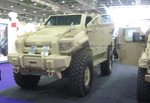
|
N/A | [27] | |
| Gladiator | N/A | [27] | ||
| Typhoon 6x6 | N/A | (Armed with a HMG).[27] | ||
| Tornado 6x6 | N/A | [27] | ||
| Shrek One | 
|
N/A | [27] | |
| OTT PUMA M36-15 | N/A | (Armed with a 12.7mm DShK).[27] | ||
| Paramount Maurader | 
|
N/A | [27] | |
| Casspir | 
|
N/A | [27] | |
| OTT Casspir | 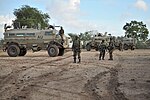
|
N/A | (Armed with a 12.7mm DShK).[27] | |
| RG-31 Nyala | 
|
N/A | (Used by the Gendarmerie).[27] | |
| VP11 | N/A | [27] | ||
| Infantry Mobility Vehicles (IMVs) | ||||
| Panhard PVP | 
|
N/A | (Armed with a 12.7mm M2 HMG).[27] | |
| ACMAT Bastion | 
|
N/A | [27] | |
| ACMAT Bastion | 
|
N/A | (Ambulance).[27] | |
| URO VAMTAC | 
|
N/A | [27] | |
| Stark Motors Storm | N/A | [27] | ||
| Kia KLTV | 
|
N/A | (Armed with a 7.62mm PKM LMG).[27] | |
| VN-4 | 
|
N/A | [27] | |
| Cougar | 
|
N/A | [27] | |
| Python | N/A | (Not yet seen).[27] | ||
| All-Terrain Vehicles (ATVs) | ||||
| Lynx CS/VP11 | N/A | [27] | ||
| Utility Vehicles | ||||
| ACMAT ALTV | 
|
N/A | [27] | |
| ACMAT ALTV Ambulance | N/A | [27] | ||
| MasstecH T4 | 
|
N/A | [27] | |
| Kia KM420 | 
|
N/A | [27] | |
| Kia KM450 | 
|
N/A | [27] | |
| Kia KM450 Ambulance | 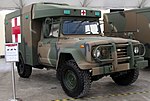
|
N/A | [27] | |
| Dongfeng EQ2500 | 
|
N/A | [27] | |
| Toyota Land Cruiser | 
|
N/A | [27] | |
| Toyota Land Cruiser Ambulance | 
|
N/A | [27] | |
| Toyota Land Cruiser Prado | 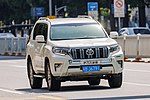
|
N/A | [27] | |
| Toyota Land Cruiser GXR | 
|
N/A | [27] | |
| Nissan NP300 | 
|
N/A | [27] | |
| Nissan Frontera | 
|
N/A | [27] | |
| Mitsubishi L200 | 
|
N/A | [27] | |
| Land Rover Defender | 
|
N/A | [27] | |
| Land Rover Defender | 
|
N/A | (Ambulance).[27] | |
| Towed Artillery | ||||
| 100mm MT-12 'Rapira' | 
|
N/A | [27] | |
| 122mm D-30 | 
|
N/A | [27] | |
| Multiple Rocket Launchers (MRLs) | ||||
| 107mm Type-63 | 
|
N/A | [27] | |
| 122mm 9P122 'Grad-P' | 
|
N/A | [27] | |
| 122mm BM-21 'Grad' | 
|
N/A | [27] | |
| Mortars | ||||
| 60mm M57 | 
|
N/A | [27] | |
| 82mm 82-BM-37 | 
|
N/A | [27] | |
| 120mm PM-43 | 
|
N/A | [27] | |
| (Self-propelled) Anti-Aircraft Guns | ||||
| 12.7mm DShK | 
|
N/A | [27] | |
| 14.5mm ZPU-1 | 
|
N/A | [27] | |
| 14.5mm QJG-02 | 
|
N/A | [27] | |
| 23mm ZSU-23-4 'Shilka' | 
|
N/A | (Rarely used operationally).[27] | |
| Unmanned Aerial Vehicles (UAVs) | ||||
| Hawker Q800X | N/A | [27] | ||
| Trucks | ||||
| ACMAT VLRA 4x4 | 
|
N/A | [27] | |
| ACMAT VLRA 6x6 | 
|
N/A | [27] | |
| Berliet GBC-180 | 
|
N/A | [27] | |
| Renault T430 | 
|
N/A | [27] | |
| Renault Kerax | 
|
N/A | [27] | |
| Renault Kerax Wrecker | 
|
N/A | [27] | |
| SNVI M120 | 
|
N/A | [27] | |
| SNVI M230 | 
|
N/A | [27] | |
| SNVI M350 | 
|
N/A | [27] | |
| Iveco 330.30 ANW | 
|
N/A | [27] | |
| Iveco Eurocargo | 
|
N/A | [27] | |
| DAF 2800 6x4 | 
|
N/A | [27] | |
| MAN KAT1 4x4 | 
|
N/A | [27] | |
| MAN KAT1 6x6 | 
|
N/A | [27] | |
| MAN TGS 35.440 | 
|
N/A | [27] | |
| Mercedes-Benz MB1017 | 
|
N/A | [27] | |
| Mercedes-Benz Actros | 
|
N/A | [27] | |
| Mercedes-Benz Atego | 
|
N/A | [27] | |
| Magirus Eckhauber | 
|
N/A | (3. Generation).[27] | |
| Unimog 1300 | 
|
N/A | [27] | |
| Unimog 1300 | 
|
N/A | (Ambulance).[27] | |
| Ural-4320 | 
|
N/A | [27] | |
| GAZ-3308 'Sadko' | 
|
N/A | [27] | |
| Dongfeng EQ1092F | N/A | [27] | ||
| Dongfeng EQ140-1C | 
|
N/A | [27] | |
| Dongfeng EQ240 | 
|
N/A | [27] | |
| FAW CA1122J | N/A | [27] | ||
| Howo Sinotruk 4x4 | 
|
N/A | [27] | |
| Howo Sinotruk 6x6 | 
|
N/A | [27] | |
| Hongyan Genlyon | 
|
N/A | [27] | |
| Jiefang J5 | N/A | [27] | ||
| Sachman SX2190 | N/A | [27] | ||
| Engineering Vehicles | ||||
| Caterpillar bulldozer | 
|
N/A | [27] | |
| M-Boot | 
|
N/A | [27] | |
Equipment formerly in service
[edit]| Name | Image | Origin | In Stock | Notes |
|---|---|---|---|---|
| Tanks | ||||
| T-34/85 | 
|
N/A | [27] | |
| FT-17 | 
|
N/A | [27] | |
| Armoured Fighting Vehicles (AFVs) | ||||
| BTR-40 | 
|
N/A | [27] | |
| 9P133 | 
|
N/A | (Some repurposed as fire-support vehicles armed with ZU-23s).[27] | |
| Towed Artillery | ||||
| 76mm ZiS-3 | 
|
N/A | [27] | |
| 85mm D-44 | 
|
N/A | [27] | |
| Multiple Rocket Launchers (MRLs) | ||||
| 132mm BM-13 | 
|
N/A | [27] | |
| Anti-Aircraft Guns | ||||
| 14.5mm ZPU-2 | 
|
N/A | [27] | |
| 37mm M-1939 | 
|
N/A | [27] | |
| Surface-To-Air Missile Systems (SAMs) | ||||
| S-125 | 
|
N/A | [27] | |
| Radars | ||||
| P-12/18 'Spoon Rest' | 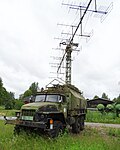
|
N/A | [27] | |
| P-15 'Flat Face A' | 
|
N/A | [27] | |
| SNR-125 'Low Blow' | 
|
N/A | (for S-125), (Not yet seen).[27] | |
| Utility Vehicles | ||||
| UAZ-452 | 
|
N/A | [27] | |
| UAZ-469 | 
|
N/A | [27] | |
| GAZ-69 | 
|
N/A | [27] | |
| Beijing BJ212 | 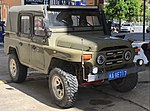
|
N/A | [27] | |
| VW Iltis | 
|
N/A | [27] | |
| VW T3 | 
|
N/A | [27] | |
| Land Rover Series III | 
|
N/A | [27] | |
| Trucks | ||||
| GAZ-66 | 
|
N/A | ||
| ZiL-131 | 
|
N/A | [27] | |
| ZiL-157 | 
|
N/A | [27] | |
| MAZ-537 | 
|
N/A | [27] | |
| Ural-4320 Crane | 
|
N/A | [27] | |
| Mercedes-Benz SK | 
|
N/A | [27] | |
| Mercedes-Benz 1113 | 
|
N/A | (Double Cabin).[27] | |
| MAN Hauber | 
|
N/A | [27] | |
| Magirus Eckhauber | 
|
N/A | [27] | |
| Unimog Ambulance | 
|
N/A | (Ambulance).[27] | |
| Renault R340 | 
|
N/A | [27] | |
| Unknown Truck | N/A | N/A | [27] | |
| Engineering Vehicles | ||||
| GSP-55 | 
|
N/A | [27] | |
| PTS | 
|
N/A | [27] | |
| Hanomag Dozer | 
|
N/A | [27] | |
| Grader | 
|
N/A | [27] | |
| Unknown Loader | N/A | N/A | [27] | |
| Unknown Roller | N/A | N/A | [27] | |
Training establishments
[edit]The Malian armed forces have at least two significant training establishments:
- Joint Military School at Koulikoro
- Alioune Blondin Beye Peacekeeping Training School at Bamako (fr:École de maintien de la paix Alioune Blondin Beye de Bamako)
The Alioune Bloundin Beye school is the tactical-level component of a trio of three ECOWAS peacekeeping training schools: the Alioune Bloundin Beye school (EMPABB), the Kofi Annan International Peacekeeping Training Centre in Accra, Ghana (operational level), and the Nigerian National Defence College (strategic level).[28] The school has trained over 6900 students since its opening and is currently supported financially and technically by seven countries and as well as the ECOWAS.[29]
Air Force
[edit]
The Mali Air Force (Armée de l'air du Mali) was founded in 1961 with French supplied military aid. This included MH.1521 Broussard utility monoplane followed by two C-47 transports until Soviet aid starting in 1962 with four Antonov AN-2 Colt biplane transports and four Mi-4 light helicopters.[30] It used to operate MiG jets but is currently equipped with cargo aircraft, light attack aircraft and helicopters.
References
[edit]- ^ a b c DISCOURS DE AMADOU TOUMANI TOURE, PRESIDENT DE LA REPUBLIQUE, : CINQUANTENAIRE DU 20 JANVIER Archived 22 July 2011 at the Wayback Machine (Speech by Amadou Toumani Touré, President of the Republic Demi-Centennial of 20 January), primature.gov.ml, 20 January 2011. The President of Mali's Demi-Centennial Army Day speech, with a detailed history of the formation of the Malian Armed Forces and withdrawal of French forces.
- ^ 49EME ANNIVERSAIRE DU 20 JANVIER Archived 22 July 2011 at the Wayback Machine, Discours de Amadou Toumani TOURE, Président de la République,(49th Anniversary of 20 January, speech by Amadou Toumani Touré, President of the Republic of Mali), primature.gov.ml, 20 January 2010. The President of Mali on the History of the Malian Armed forces.
- ^ a b Fete de l'armee: Beintot un demi siecle. Archived 22 July 2011 at the Wayback Machine S. Konate. L’Essor n°16365, 2009-01-19. Reprinted on primature.gov.ml.
- ^ Financial Times, World Desk Reference Mali Defense Archived 10 February 2012 at the Wayback Machine
- ^ a b c d e f "Trade Registers". Armstrade.sipri.org. Archived from the original on 14 April 2010. Retrieved 6 January 2019.
- ^ a b "Mali Gets Warplanes From Russia, Drones From Turkey". The Defense Post. 15 March 2023. Archived from the original on 31 July 2023. Retrieved 31 July 2023.
- ^ "The World Factbook". Central Intelligence Agency. United States Federal Government. 12 January 2017. Archived from the original on 30 March 2021. Retrieved 20 January 2017.
- ^ a b Library of Congress, Country Profile Archived 5 April 2015 at the Wayback Machine, January 2005
- ^ IISS Military Balance 2009 p.310
- ^ a b Herbert Howe, Ambiguous Order: Military Forces in African States, Lynne Rienner, 2005, p.277
- ^ État-major général des armées : Le colonel Gabriel Poudiougou promu Général de brigade Archived 9 March 2012 at the Wayback Machine. L'Indépendant, 12/06/2008
- ^ Dixon, Robyn; Labous, Jane (4 April 2012). "Gains of Mali's Tuareg rebels appear permanent, analysts say". Los Angeles Times. Johannesburg and London. Archived from the original on 10 February 2022. Retrieved 10 February 2022.
- ^ Pflanz, Mike (1 May 2012). "Mali counter-coup fails". The Daily Telegraph. Archived from the original on 5 April 2018. Retrieved 4 April 2018.
- ^ "Mali troops return to key northern city after six-year absence". Reuters. 13 February 2020. Archived from the original on 14 February 2020. Retrieved 14 February 2020.
- ^ "Militants kill 54 in attack on Mali army post, ISIS claims responsibility". NBC News. 3 November 2019. Retrieved 12 December 2019.
- ^ "Mali : Les groupes islamistes armés et l'armée prennent les civils pour cible" (in French). Human Rights Watch. 1 November 2023. Archived from the original on 14 December 2023. Retrieved 1 January 2024.
- ^ Darya Tarasova; Tim Lister; Avery Schmitz (29 July 2024). "Dozens of Russian mercenaries killed in rebel ambush in Mali, in their worst known loss in Africa". CNN. Retrieved 30 July 2024.
- ^ "Attack by al-Qaeda linked group in Mali killed more than 70 people". Al Jazeera English. 17 September 2024. Retrieved 20 September 2024.
- ^ "State Department" (PDF). Archived (PDF) from the original on 24 May 2019. Retrieved 24 May 2019.
- ^ http://www.malikounda.com/nouvelle_voir.php?idNouvelle=20217[permanent dead link]
- ^ "Mali | Africa Center for Strategic Studies". Archived from the original on 28 February 2010. Retrieved 9 March 2010.
- ^ United States European Command, 1/10 Special Forces Group Supports Pan Sahel Initiative Archived 26 September 2012 at the Wayback Machine, 2004
- ^ "Special Operations Command Europe Trains African Soldiers | EUCOM, Stronger Together". Archived from the original on 27 September 2011. Retrieved 24 December 2010.
- ^ a b Ennaharonline.com, French troops for anti-terrorist training in Mali Archived 8 August 2014 at the Wayback Machine, 13 April 2010.
- ^ "Saharan states to open joint military headquarters". BBC. 21 April 2010. Archived from the original on 23 April 2010. Retrieved 22 April 2010.. See also http://www.guardian.co.uk/world/us-embassy-cables-documents/231198 Archived 30 March 2012 at the Wayback Machine – 09ALGIERS0048, on Tamanrassat committee
- ^ "Mali: training in the use of the armored vehicle "Bastion"". difesaonline.it. 22 February 2016. Archived from the original on 6 January 2019. Retrieved 5 January 2019.
- ^ a b c d e f g h i j k l m n o p q r s t u v w x y z aa ab ac ad ae af ag ah ai aj ak al am an ao ap aq ar as at au av aw ax ay az ba bb bc bd be bf bg bh bi bj bk bl bm bn bo bp bq br bs bt bu bv bw bx by bz ca cb cc cd ce cf cg ch ci cj ck cl cm cn co cp cq cr cs ct cu cv cw cx cy cz da db dc dd de df dg dh di dj dk dl dm dn do dp dq dr ds dt du dv dw dx dy dz ea eb ec Oryx. "Sons of Bamako - Malian Armed Forces Fighting Vehicles". Oryx. Archived from the original on 8 October 2022. Retrieved 21 March 2023.
- ^ http://www.ambafrance-gh.org/spip.php?article115 Archived 7 July 2010 at the Wayback Machine. Retrieved September 2011
- ^ http://www.empbamako.org/ Archived 25 February 2015 at the Wayback Machine Retrieved February 2015
- ^ World Aircraft Information Files. Brightstar Publishing, London. Files 337, Sheet 04.
![]() This article incorporates public domain material from The World Factbook (2025 ed.). CIA. (Archived 2003 edition.)
This article incorporates public domain material from The World Factbook (2025 ed.). CIA. (Archived 2003 edition.)
Further reading
[edit]- 'Insurgency, disarmament, and insecurity in Northern Mali 1990–2004,' in Nicolas Florquin and Eric G. Berman (eds.) Armed and Aimless Armed Groups, Guns, and Human Security in the ECOWAS Region, Small Arms Survey, ISBN 2-8288-0063-6, May 2005
- Mahamadou Nimaga, 'Mali', in Alan Bryden, Boubacar N'Diaye, 'Security Sector Governance in Francophone West Africa: Realities and Opportunities,' DCAF/Lit Verlag, 2011.
- Jared Rudacille, "Security Sector Reform's Utility in Conflict Prevention Archived 6 June 2022 at the Wayback Machine," Monograph written as part of a degree requirement at the US School of Advanced Military Studies, November 2013. (Includes case study of US aid to security sector reform in Mali, 2004–2012.)
External links
[edit]- Soldiers training during the Northern Mali conflict Archived 2 January 2017 at the Wayback Machine
- http://www.jamana.org/lesechos/articles/2005/septembre/ec1_actu15_0905.html Archived 16 March 2012 at the Wayback Machine – two new Malian generals, total eight
- https://web.archive.org/web/20101224193445/http://www.wikileaks.ch/cable/2009/12/09BAMAKO815.html – "Closing ceremony of JCET training for Malian army"
